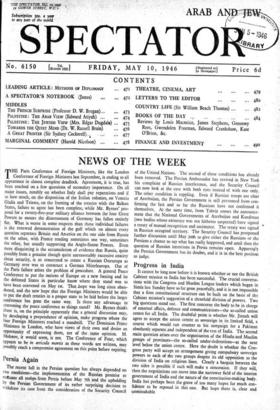Progress in India
It cannot be long now before it is known whether or not the British Cabinet mission to India has been successful. The crucial conversa- tions with the Congress and Muslim League leaders which began in Simla last Sunday have so far gone peacefully, and it is not impossible that a firm constitutional structure can be built on the basis of the Cabinet mission's suggestion of a threefold division of powers. Two big questions stand out. The first concerns the body to be in charge of external affairs, defence and communications—the so-called union centre for all India. The doubtful point is whether Mr. Jinnah will agree to accept the union centre as sovereign in its limited field, a course which would run counter to his campaign for a Pakistan absolutely separate.and independent of the rest of India. The second main question arises over the organisation of the Hindu and Muslim groups of provinces—the so-called under-federations—at the next level below the union centre. Here the doubt is whether the Con- gress party will accept an arrangement giving compulsory sovereign powers to each of the two groups despite its old oppoSition to the division of India on religious lines. Clearly a bargain between the two sides is possible if each will make a concession. If they will, then the negotiations can move into the narrower field of the interim government of India and the nature of the constitution-making body. India has perhaps been the grave of too many hopes for much con- fidence to be reposed in this one. But hope there is, clear and unmistakable


























